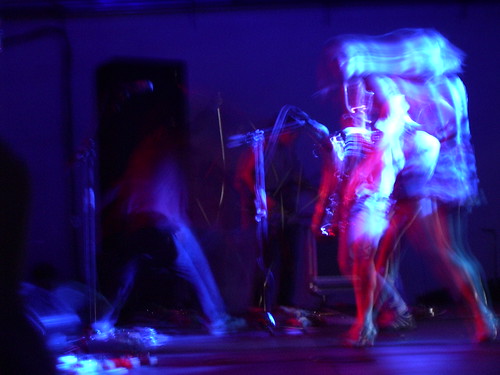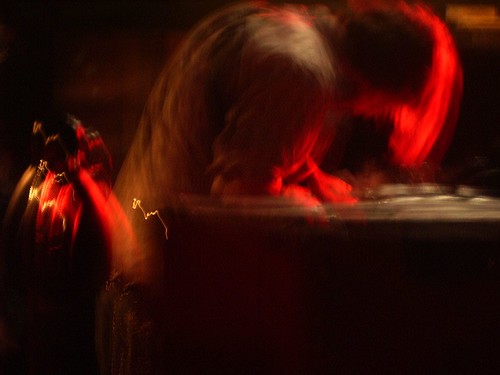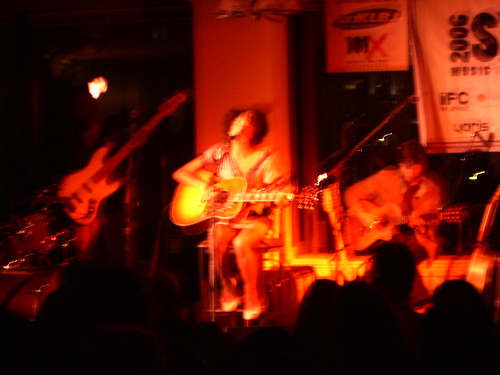[This feature ran in
Mojo earlier this year; writing it was a dream come true, since
You're Living All Over Me has been an obsession for me since I first bought it, on scratchy second hand vinyl, back in the Summer of 1992. I had so many great stories from Lou, J and Murph, it could've been twice as long. Big thanks to Jon Fetler, John Robb and Lee Ranaldo for talking to me for this, also.]

J Mascis said later that ploughing his guitar into Lou Barlow’s bass “made a nice sound”.
The angst that fuelled their music, a volatile, subterranean swarm of influences Mascis translated into “earbleeding Country”, ultimately consumed Dinosaur Jr. Playing the Night Shift, a ratty little club inside a shopping mall in Naugatuck, Connecticut in the early Spring of 1988, their simmering passive-aggressions erupted into ineffectual violence. Years of unresolved hostility had fractured their fragile dynamic. The taciturn front-man realised he had to act.
“I kept thinking, wow, Murph’s gonna hit Lou,” remembers Mascis today. “Then I realised Murph wasn’t gonna hit Lou, that it was up to me.”
Bassist Lou Barlow was playing a single note of feedback instead of the bass-line to ‘Severed Lips’, an act of blatant sabotage. Mascis responded by swinging his guitar at Barlow, who deflected the blow with his bass and fell to the ground. After a few further glancing blows, Mascis sloped offstage; Barlow leapt onto the drum-riser, pumping fist and screaming a triumphant “Yes!”
“…Like he had won some psychic battle by making me react,” continues Mascis, distaste etched on his usually-emotionless features. “I walked offstage thinking, Jesus he’s fucked up. Whatever he was going through was too much for me to deal with.”
“I was watching the whole thing and thinking, I should just kill both of them,” sighs Emmett Jefferson ‘Patrick’ Murphy III, better known as Dinosaur’s drummer Murph, from his home in Massachusetts. “I was ready to put them in a headlock and bang their heads together. It was ridiculous.”
The dysfunction at Dinosaur’s core was legendary, their friction productive. Hardcore kids and Oi! obsessives, they cannibalised the carcass of classic rock and, like contemporaries Meat Puppets, Husker Du and Butthole Surfers, drew something fresh and strange from the melee, like fallout from the Atom Bomb that was hardcore. Their intemperate music saw melodic pastorals torn apart by autistic blasts of noise, flashes of hormonal frenzy, the product of weeks these abrasive, mismatched personalities spent cooped up together in their claustrophobic ’76 Dodge tour-van.
Their differences ran deep. Mascis was one of the few punks in Amherst, Massachusetts, a liberal college town. The schools were progressive, they wouldn’t punish students, making them discuss their anti-social behaviour in counselling sessions instead, a memory at which the legendarily withdrawn guitarist shudders.
“I picked up a copy of Sounds magazine’s Punk’s Not Dead special at a local record store, and ordered in most of the magazine’s Top 100 Punk Singles Of All Time. I loved them all, GBH, Discharge, The Exploited, Blitz… I even liked Skrewdriver. I didn’t know the politics involved, so I could just enjoy it devoid of any moral judgement. I’m sure a lot of musicians are dicks.”
He shaved off most of his hair and cut the rest to uneven lengths, a style he called “the chemotherapy”, to his mother’s dismay. Later, he would mimic Nick Cave’s Birthday Party-era haircut.
“…The ‘finger in the power-socket’ look. He’d achieve that by frying egg-whites into his hair with straightening-tongs,” laughs Dinosaur’s first manager/roadie Jon Fetler, who spun Mott The Hoople records at school dances with Mascis as a proto-Beavis and Butthead DJ duo during their High School years.
While at the record store, Mascis met 14 year old Dee Dee Ramone-lookalike Scott Helland flipping through the import punk racks, and posting a ‘Drummer Wanted’ ad on the wall, for local hardcore band Deep Wound. A week later, Mascis’s dad drove J to guitarist Lou Barlow’s house in Westfield, 45 minutes south-west of Amherst, for the audition. Mascis remembers that they had similar music tastes and, “Since Lou didn’t talk at the time, he was easy to get on with.”
Mascis hailed from rarefied Amherst. Barlow was from resolutely blue collar Westhurst, a dying factory town. These class differences would rule Dinosaur.
“The kids from Amherst were snots,” says Barlow, calling from the waiting room of his eight-months-pregnant wife Kathleen’s obstetrician in their new home Los Angeles. “I wasn’t at all jaded, I was spastic and excited, saying goofy stuff, reading fanzines. J was adept at making me feel like a fucking dweeb, cutting me dead with a one-liner.”
“He was the classic nerd, the kind who would get beat up by jocks,” replies Mascis. “I was an angry young man. If people were looking to be abused, I’d abuse them. Lou was a real victim.”
Barlow was besotted with hardcore, Minor Threat and Black Flag and their followers. “All the songs were 30 seconds long, played as fast as humanly possible, the 7”s would come with detailed lyrics sheets…” he sighs. “It matched my energy level, my anger level.”
Helland, Barlow and Mascis were joined by singer Charlie Nakajima, and the quartet played shows and released an EP, Video Prick, in the Summer of 1983. Their thrashing, super-fast punk won notices in the fanzines, but they split the following year.
“Hardcore seemed like it was over,” shrugs Mascis, who had been writing songs of his own in downtime from Deep Wound, songs that drew upon different passions: country music, Black Sabbath, the murkier regions of post-punk, and his beloved Birthday Party. “Music was one of my only interests,” he observes, though his outward lack of passion might fool you into thinking even that’s untrue.
J was coasting in college, taking courses that fed his interest in Adolf Hitler and World War II; one of his lecturers was a former SS Officer. He set about forming Dinosaur, recruiting Nakajima on vocals. To achieve the sound he could hear in his head, Mascis would play lead guitar, asking Barlow to move over to the bass. Mascis’s vacated drumstool would be taken by Murph, an old friend of J’s from High School who had played in “pseudo-Oi!” band All White Jury.
“I was a hippy punk, I loved hardcore but I listened to lots of Hendrix too; they weren’t down with that at all,” says Murph. “I smoked lots of weed, they were straight-edge. I made them feel uncomfortable, because I’d grown up in NYC, going to rock concerts and stealing my parents’ car for joyrides, doing stuff they couldn’t fathom. We had a mutual fascination: they couldn’t believe I was so wild, I couldn’t believe they never said anything.”
The band played one show with Nakijima on vocals before J quit the band. Over the next couple of days, he called up Murph and Barlow, to play together again. “I said, ‘you’re reforming the band’, but he denied it,” laughs Murph. “But he
was reforming the band, only without Charlie. Charlie was pretty ‘anarchist’, he and J clashed a lot.”
J elected to split vocal duties between him and Lou. “He played me these songs, and the change in direction was obvious,” says Barlow. “These were
rock songs, not blinding power-chord anthems. There was a country song. J was unafraid to reference classic-rock stuff that wasn’t ‘cool’. And he had cultivated an idiosyncratic voice, like all the great rock singers: Dylan, Lou Reed, Neil Young.”
Almost immediately, however, the conflicts that would dominate Dinosaur for the next three albums began to surface, though the band-mates themselves were initially unconcerned. “Rock bands are generally miserable people, I knew my rock’n’roll history,” laughs Lou now. “You didn’t have to get along, that was a ‘hippy’ ideal. Rock’n’roll was about a bunch of ambivalent people getting together, hating each other and playing loud, nasty, hateful music.”
Certainly, Dinosaur thrived on this tension. They began playing shows in Amherst and nearby areas, but were soon banned from most venues for their sheer, brutal volume. “I was breaking
cymbals, I was hitting my drums so hard,” remembers Murph. “We were into the concept of noise pollution, of
feeling the music, as much as hearing it.”
“My guitar style came from trying to recreate the experience of drumming, playing loud and getting into the dynamics, using pedals. We just kept playing, even though people hated us,” grins Mascis. “We didn’t belong to a ‘scene’, we didn’t have any fans. At Chet’s Last Call [a club near Boston Gardens] the soundman threw a bottle at me, because I was playing too loud.”
They did have one fan, however, and an influential one. Gerard Cosloy had known Mascis since before he raved about Deep Wound in his Conflict fanzine, later becoming that band’s manager. Now, he ran Homestead Records, a small indie, and offered to release Dinosaur’s first record. Despite only having played a handful of shows, the band repaired to the basement of Chris Dixon, a local hippy who mostly recorded folk and jazz on his analogue 24-track setup, but adapted his technique to Dinosaur’s hybrid metallic country. They recorded quickly; the entire sessions cost $500.
The songs on Dinosaur’s eponymous first album were wonderfully odd, misshapen, running the gamut of Mascis’s omnivorous hunger for music. ‘Repulsion’ and ‘Severed Lips’ conformed to traditional country-rock structures, but were fringed with fiery noise; within a flash, melodies would be engulfed in distortion and feedback. Elsewhere, the bare, vulnerable lyrics essayed loneliness and alienation with an eerie accuracy, Mascis howling “Why won’t you be my friend?” on ‘Qwest’, and declaring himself “Embarrassed to be alive” on ‘The Leper’, as tungsten riffs crackled underneath. “The Leper made me unembarrassed to love Black Sabbath,” said Evan Dando of Boston’s Lemonheads, later. Dinosaur’s reclamation of heavy rock’s arsenal from the scrap-heap of history would prove influential, expressing a kinship they felt with contemporaries like Arizona’s Meat Puppets, trippy country-fried desert-wanderers as of their sublime second album, and the similarly psychedelic Dream Syndicate.
“The bands coming up through the 1980s were mostly shying away from what they perceived as the ‘hippy’ mannerisms,” remembers Lee Renaldo of Sonic Youth, whose Daydream Nation opus was explicitly influenced by Dinosaur’s sprawling, mutant classic-rock. “And then Dinosaur came along, combining hardcore with the most beautiful elements of 60s rock.”
Sonic Youth took Dinosaur on their first national tour, shortly after the album came out. “Back in those days, it was hard to get three sentences in a row out of J,” remembers Renaldo. “There were a lot of things bubbling under the surface between them, that none of them wanted to deal with in any way.”
“We weren’t the ‘bonding’ types we wanted to be,” adds Mascis, with considerable understatement. The confines of the tour-van exacerbated conflicts, and a dysfunctional dynamic soon slipped into place, Barlow desperately seeking some affirmation from the aloof Mascis, who would greet his band-mate’s neediness with acrid disdain. Murph, meanwhile, would goad both, chafing at the intense atmosphere.
“We were three very big egos, feeling crowded,” says Murph. “The tension was: Your Space is invading My Space.”
On one of these interminable bus trips across America, an exasperated Mascis summed up these feelings in an affecting little phrase speaking volumes of the unvoiced angst and intolerance growing within Dinosaur: “You’re Living All Over Me”.
Dinosaur recorded their second album in New York with the assistance of Sonic Youth associate Wharton Tiers. Mascis drafted Renaldo in to sing harmonies on the opening track, Little Fury Things, and experimentation was rife. You’re Living All Over Me had an even broader musical embrace than its predecessor, taking in their love of early industrial music (SPK, Throbbing Gristle), and containing various ‘avant garde’ gestures, such as the avalanches of tape distortion that swallowed up the sleepy-eyed ‘Tarpit’, or the ghostly, disturbing voices that materialise on ‘Raisins’ and ‘In A Jar’, captured illicitly by Barlow while he was working at a mental institution. More audacious still was ‘Sludgefeast’, which volleyed with autistic grace from playful folk-rock to colossal Sabbath riffage, and the closing track, ‘Poledo’, Lou’s exercise in suicidal folk and tape manipulation.
“I had started smoking weed, and everything sounded
wonderful,” recalls Barlow. “I saw You’re Living All Over Me as a psychedelic rock record, and figured ‘Poledo’ would work as the bullshit freakout track, the album’s ‘Revolution #9’.”
‘Poledo’ and ‘Lose’ marked the first (and last) Barlow compositions on a Dinosaur album. The band were cast very much in Mascis’s own image (he even dictated Murph’s every drumbeat, curtailing his jazz-fusion tendencies), but was glad Barlow was finally contributing. “Getting Lou to bring songs to the table was excruciating,” he grumbles. “He was afraid of getting shot down, or that we would ruin them.”
Barlow would spend hours smoking pot on his own (Mascis was prone to migraines and didn’t even drink, Murph had been through rehab), playing back the tapes for the album, revelling in what they’d created. “I was becoming even more convinced of J’s genius and power,” he adds. “Unfortunately, I became so in awe of him, I couldn’t bring myself to play him my songs. And he had no idea, and was incapable of reaching out to me or encouraging me.”
You’re Living All Over Me would prove a peak for the band. Many of their initial ambitions had been fulfilled: they had signed to SST, home to Black Flag, Husker Du and many other spiritual kin, had appeared in Byron Coley’s ‘zine Forced Exposure, and had toured with Sonic Youth. “I used to see the same thing in Nirvana, after they broke big,” reasons Murph. “We’d given so much, played our last game, and didn’t know where to go next.”
The tour to promote the album was disastrous, trashing the fragile ceasefire of hostilities the You’re Living All Over Me sessions signalled and cutting short the lifespan of the original line-up. The van broke down on the first day, ninety minutes outside Amherst. Murph was feeling “undervalued”, and talked about punching Mascis. SST hadn’t distributed the album to stores yet, so shows were sparsely attended. Their personal habits began to grate intolerably, especially Barlow’s oral fixation, forever sucking on something. When he began nursing on the eyeball of Mascis’s Cookie Monster doll, something snapped.
“We were the first ‘Sesame Street’ generation, and J took genuine offence at Lou licking the eyeballs of this childhood relic,” observes Fetler, who road-managed the band for this tour. Fetler was no roadie, though, baffled by most of the job’s technical requirements. An English graduate and an old friend of J’s, he went along to accrue material for future writing, and soon became the band’s unofficial therapist, running interference with their antagonistic egos. His services would be called into play when the van broke down again in Idaho, enforcing a four day lockdown in a cramped hotel room.
“We had too much time on our hands, which I spent picking Lou’s life apart,” remembers Mascis, with a curious cocktail of relish and regret. “I think we pushed Lou over the edge.”
It was Murph who broke, however. “Murph was the body of that band, he felt the pain on a more fundamental level,” says Fetler. “We were arguing over who got to sleep on the floor. Murph finally broke down, and trashed the room, chucking things about, lamps, chairs…”
Fetler describes the event as “A cloud-break. Afterwards, everyone repaired to their respective corners. It was so great to be on the road, travelling America in our own van, free. And every night, all those dysfunctions and dark emotions would be channelled into this phenomenally powerful music. But after Idaho, there was a definite realisation that this couldn’t continue any longer. After the boil, you get the cool, and that’s what you can hear on Bug. The intensity has totally diminished.”
Mascis recorded the original line-up’s final album mostly on his own with engineers Paul Q Kolderie and Sean Slade (who would later work with Radiohead, Uncle Tupelo and most of Boston’s indie-rock scene); Murph and Lou were in the studio for three days, recording their tracks and then leaving. Serious new rifts had developed within this already-torturous unit.
“The lyrics, the title, all spelt out that J was unhappy,” Barlow remembers. “There was a Bug in the ointment, and the ‘bug’ was me.”
In addition to discovering drugs, Barlow had got himself a girlfriend, Kathleen Bilius, who he soon moved in with. “I finally had someone to listen to me talk,” remembers Barlow, of the relationship. “I was happy to have an emotional life outside of the band; being around J was like living in a gulag. At no point would anyone get excited about anything, and I decided I needed that in my life.”
Barlow’s withdrawal wasn’t just emotional; he had also now found an artistic outlet outside the band, via his home-recorded music, later released under the Sebadoh, Sentridoh and Folk Implosion monikers. “I felt the music of the underground had become one-dimensional, noisy, and I wanted to fashion my own response to that. I knew I was on the right track, when people said I was a ‘pussy’ for playing an acoustic guitar. I’d found my new passion: quiet was the new loud.”
“He did a total 180 degree turn when he met Kathleen,” winces Mascis. “He began talking all the time. And I decided I preferred him better when he didn’t talk at all. His priorities shifted, treating the band like a job.”
Mascis isn’t a fan of Bug. “I interviewed Ozzy Osbourne once, and he said he hated Sabotage, that it just reminded him of Sabbath recording with lawyers sat in the studio. I guess I feel the same way about Bug.”
‘Freak Scene’, a song of clouded relationship confusions ignited by J crunching hard on his superfuzz, was a semi-hit single, and the band toured Europe for the first time, alongside Sonic Youth, Rapeman and Band Of Susans. The UK music press misinterpreted the band’s social catatonia as middle class American apathy – thus the inaccurate ‘slacker’ paradigm was born – but Britain’s audiences responded to the band’s lacerating decibellage with glee, including Kevin Shields, who struck up an enduring friendship with Mascis.
John Robb, frontman for Blackpool punk legends The Membranes, helped organise the UK tour, and let the band crash at his flat in Manchester, where they filmed a promo for ‘Freak Scene’. “J just sat on the settee for three days, Lou spent hours on the phone arguing with his girlfriend,” remembers Robb. “So Murph and I would go round the corner to my mate Keith’s house, which was always a 24 Hour party. The one thing J would talk about was Oi! music. It was weird to meet a guy who looked liked Tiny Tim, but knew all the words to all the Discharge songs.”
Compared to You’re Living All Over Me, Bug was unadventurous, though it later came to define America’s burgeoning indie-rock sound. Mascis felt pressed to pad out the slender album, closing it with ‘Don’t’, a self-confessed piece of filler with Barlow bellowing “Why don’t you like me?” over a mordant swamp riff. Barlow exited the session coughing up blood.
A tour followed, dogged by Barlow’s withdrawal, the psychic warfare becoming untenable. “I recently found letters I’d written my wife on that tour,” says Barlow, “I hated them! I channelled all my ambivalence into ‘Fuck J, Fuck this lazy-assed band’. We settled into playing routine live shows.”
Soon, Barlow and Mascis stopped talking altogether. So when, in May 1989, Mascis and Murph visited Barlow’s kitchen, shortly after playing a show at the John Ausomnford Theatre in Hollywood, it was Murph who had to tell Lou he was fired.
Barlow: “Murph said, ‘we’re breaking up the band’. And then they left. J didn’t say a word.”
Mascis: “Afterwards, I kinda realised he might’ve thought we were actually splitting the band, as opposed to just kicking him out.”
Murph: “Truthfully, we were kicking Lou out the back-door. We had the tour in Australia, with Donna Dresch on bass, already planned, but we didn’t tell him.”
Barlow discovered the truth the next day, from Gerard Cosloy. He stormed off to a friend’s house, where J and Murph were hanging out.
“The next day was like torture,” recalls Mascis. “Hours of Lou screaming and yelling at us.”
“I was pretty volatile,” admits Barlow. “J just sat there and said nothing. And that was it.”
Murph describes the days that followed Barlow’s exit as “a mixture of guilt and relief, though I was unsure where we’d draw our artistic fuel, without our original dynamic.” Dinosaur Jr (as they were now called, thanks to some litigious ageing Jefferson Airpane side-project named Dinosaurs) signed to Blanco Y Negro and, with the grunge explosion, scored minor mainstream success with 1992’s Where You Been. The fuel Murph spoke of was lacking however; later Dinosaur Jr records were fine guitar-drenched country-punk, but not much more. The band fizzled out in 1997. “It just seemed like it was over now,” says Mascis, words that could have been Dinosaur lyrics.
Barlow went on to form Sebadoh with Eric Gaffney and Jason Loewenstein, their creative ethos of enthusiasm and democracy the antithesis of his Dinosaur experience. Bitterness lingered, however. Barlow sued Mascis for unpaid royalties in 1991, which hurt Mascis deeply. Shortly after he was awarded $10,000, Barlow’s lawyer seduced and was temporarily-engaged to Lou’s girlfriend Kathleen. “Instant karma,” mumurs Mascis.
“I was the only one who expressed any ‘I hate you, I want to kill you’ stuff,” reflects Lou. “He never seemed to care, which just drove me crazy.”
One final confrontation arose, when J attended a show on Sebadoh’s final tour.
“I went backstage, and he flipped out,” reels Mascis. “It was like no time had passed, he kept yelling at me, even though it was a decade after the split. I think he was on drugs; his mom and dad were there too, and they kept asking me, ‘J, what’s going on?’ [laughs]”
Relations are more cordial now; Barlow joined Mascis and his Stooges covers band onstage for ‘I Wanna Be Your Dog’ in London in 2003, and, at a benefit for an Autism charity Lou’s mother runs, Deep Wound reformed for a run-through of Video Prick last Summer. There are also rumblings of a reunion tour this summer, though Mascis glumly quips, “I don’t know what good it would do.”
If it raises the profile of Dinosaur’s treasured early records, remastered and re-released this Spring, that would be enough.
“I remember Kim Gordon saying that You’re Living All Over Me could’ve gone huge like Nevermind if the production was a little cleaner,” muses Barlow. “People would go buy the exact same equipment J used, the same amps and pedals. He embraced the Marshall Stack as something that could be expressive, not some bludgeoning Heavy Metal crap. I was reading some crappy Rolling Stone 100 Greatest Guitarists Ever list a while back; Kurt Cobain was in there, Kevin Shields, even Frank fuckin’ Black, but not J. And he was so fucking influential. He was the progenitor of that style.”
(c) Stevie Chick 2005






